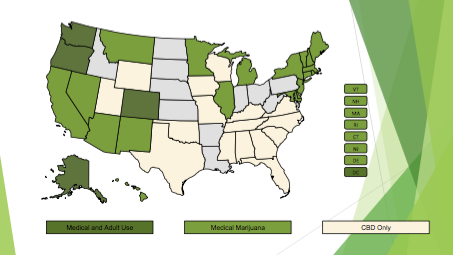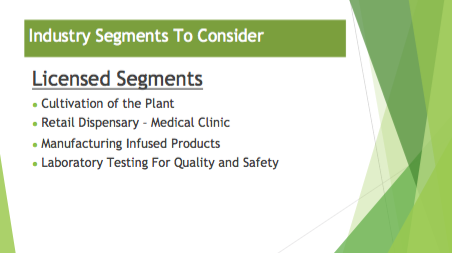State Laws and Marijuana Business Licenses: Part 2 of “Investing In the Legal Cannabis Industry” webinar from Retirement Loft
Jay and Diane speak with Tom Garlock of Retirement Lofts regarding Marijuana as a big opportunity for growing retirement portfolios as the industry takes off. Watch the video below, and scroll down to read the transcription. Part 2 starts at about 9:20 into the video.
Cannabis_webinar from Retirement Loft on Vimeo.
“Looking at this chart here from New Frontier Financials, they are predicting that medical marijuana patient growth is going to double over the next four years or so. I’m going to come out and say I believe that’s conservative, based on the number of states that we’re tracking right now. Regardless, I think any industry that you have the possible consumer number doubling, that that’s huge.
Currently there are around 23 states with medical marijuana program and/or medical marijuana laws on the books.
I’m going to take just a minute here and qualify that, because not every state is like Colorado or California. A lot of these states have extremely limited programs. I’m going to use New Jersey as an example, population 9 million. That program is so repressed, I believe there’s only four dispensaries open at that point. I would argue that New Jersey alone probably at this point has a billion-dollar cannabis industry currently, 99.99% of that the black market. Clearly, the fact that there’s only four dispensaries is not even touching the market. Unfortunately, many of these states do not have a developed industry. Therein lie additional opportunities.
Next slide, I’m going to touch on states with CBD-only laws. CBD, of course, is the non-psychoactive cannabinoid within the cannabis plant. It is quite useful for treating a number of disorders such as seizure disorders. I think the main reason states passed a CBD-only bill is because it’s a feel-good bill. The politicians are still … You know, some of them certainly are buying into the whole reefer madness thing. They’re afraid of cannabis, they think it’s dangerous. One way they’re able to begin to help their people is by passing this very, very limited bill. Not ideal, but it’s a step in the right direction.
Again, I’ll mention these 16 states with CBD-only bills, they’ve already dipped their toe in the water. They’re worth keeping an eye on because down the road, there certainly will be a greatly expanded program.
This brings us over to the states to watch. 2016 is going to be a huge year for cannabis in general.
 We’re currently tracking 16 to 17 states with some type of legalization initiative, whether it be a ballot initiative or a legislative initiative being worked on. I’m just going to mention a few here.
We’re currently tracking 16 to 17 states with some type of legalization initiative, whether it be a ballot initiative or a legislative initiative being worked on. I’m just going to mention a few here.
California, there’s currently a multi-billion dollar market. It’s really been a gray area, the Wild West, for the last 19 years. There’s very little, if any, regulation. There’s no state licensing. That’s about to change for medical, and full-on recreational use is on the ballot for November.
Florida, they attempted to pass a medical marijuana initiative two years ago. They got 58% in favor, but they needed 60%. It’s back on the ballot this November. All the signatures are in place. I absolutely expect that to pass this year.
Ohio is another state worth watching. There is a privately-funded ballot initiative that failed miserably last year, which was a good thing, because it would have created a private monopoly. I can tell you that this year it’s a different story. The Marijuana Policy Project in Washington DC is involved, and they are putting forth a much more logical open bill, and I expect to see that pass in Ohio.
Pennsylvania is in the state legislature right now. They’ve been working on that for about a year. It may go or it may not. The governor’s ready to sign it if it does. There’s some back and forth between the legislature and the Senate.
Massachusetts has had a medical marijuana program for three years, but the state politicians are quite leery of it. Only three dispensaries are currently open. I will tell you that full on adult use legalization is on the ballot this November, so we could see a real shakeup of the program out there in Massachusetts.
Nevada, of course, has a great program, medical. Very robust in its infancy of evolving. But despite the fact that there’s a wonderful medical program developing, Nevada is yet another state with a full on adult use legalization initiative that’s going to be voted on by the people in November.
Vermont, I’ll close with. This could be historic. The Vermont legislature right now is looking to pass adult use legalization. This, if it happens, it’ll happen in the next few weeks if it does, it will be the first state to pass a legalization initiative through the legislature versus a ballot initiative.
I’m going to close with a couple of sleeper states, Missouri and Arkansas. Both states are working on a ballot initiative currently that, if passed, should allow a fairly robust medical program to develop with a fair number of licenses.
National adult use market sales. Clearly, a huge growth opportunity here.
Looking at 184% growth just between 2014 and 2015. Not sure what the numbers will be this year, but clearly, we have two additional markets that probably weren’t included in the 2014 or 2015 numbers, Oregon and Washington coming online. I would expect to see this growth trend continue through 2016, and then again based on what states pass legalization this year, these programs will get built out in 2017. 2017 into 2018, I would easily expect this trend to continue for the next few years, if not be a steeper growth trend.
Industry license segments to consider.
 Licensed segments. There are basically four types of licenses that folks could apply for and attempt to secure in not only existing states, but new states. First of all what seems to the most exciting for folks is the actual cultivation of the plant, getting a license to grow marijuana. Only in America. A retail dispensary license, medical clinic, you’re a retail location. Ideally, I like the thought of what I call vertical integration, having both licenses, license to cultivate the plant and process and sell. Processing the plant would be a manufacturing infused products license. Typically within that type of business, folks are taking the raw plant material, running it through an extraction process to extract the oils, the cannabinoids within the plant, and then taking those oils to make any number of products, both medical and for recreational use. Not to leave out the fourth element, laboratory testing certainly could be extremely lucrative in certain states, as long as there’s enough of a dispensary and cultivation base to support the labs.
Licensed segments. There are basically four types of licenses that folks could apply for and attempt to secure in not only existing states, but new states. First of all what seems to the most exciting for folks is the actual cultivation of the plant, getting a license to grow marijuana. Only in America. A retail dispensary license, medical clinic, you’re a retail location. Ideally, I like the thought of what I call vertical integration, having both licenses, license to cultivate the plant and process and sell. Processing the plant would be a manufacturing infused products license. Typically within that type of business, folks are taking the raw plant material, running it through an extraction process to extract the oils, the cannabinoids within the plant, and then taking those oils to make any number of products, both medical and for recreational use. Not to leave out the fourth element, laboratory testing certainly could be extremely lucrative in certain states, as long as there’s enough of a dispensary and cultivation base to support the labs.
 Non-licensed industry segments are what we like to call the ancillary opportunities, picks and shovels. I’ll equate that back to the days of the Gold Rush. I wasn’t around, but from what I understand, the folks that consistently made the most money during the Gold Rush were those that were selling the picks and the shovels. There are a lot of ancillary opportunities in the cannabis business right now. Certainly real estate is a fabulous opportunity and there are folks making money acquiring the right properties and then leasing those properties to licensed operators. There’s certainly lots of money to be made on the equipment leasing side, and a lot of money to be made in professional services. There is a huge demand for all three of these, and that demand just continues to grow.
Non-licensed industry segments are what we like to call the ancillary opportunities, picks and shovels. I’ll equate that back to the days of the Gold Rush. I wasn’t around, but from what I understand, the folks that consistently made the most money during the Gold Rush were those that were selling the picks and the shovels. There are a lot of ancillary opportunities in the cannabis business right now. Certainly real estate is a fabulous opportunity and there are folks making money acquiring the right properties and then leasing those properties to licensed operators. There’s certainly lots of money to be made on the equipment leasing side, and a lot of money to be made in professional services. There is a huge demand for all three of these, and that demand just continues to grow.
Marijuana license acquisition in your state.
Certainly every state is different, and some states currently do not have an open program, but the good news is, most of those states will one day have an expansion of their current programs. There are some of the more robust markets like the Colorado, California, and a few others that just don’t have a limit on licenses. The barriers to entry get a little bit higher each year, but for the right group, the right plan and the proper amount of capital, you’re able to come into certain states at this point and compete for and state a new business.”
The original webinar from Retirement Lofts can be found here.